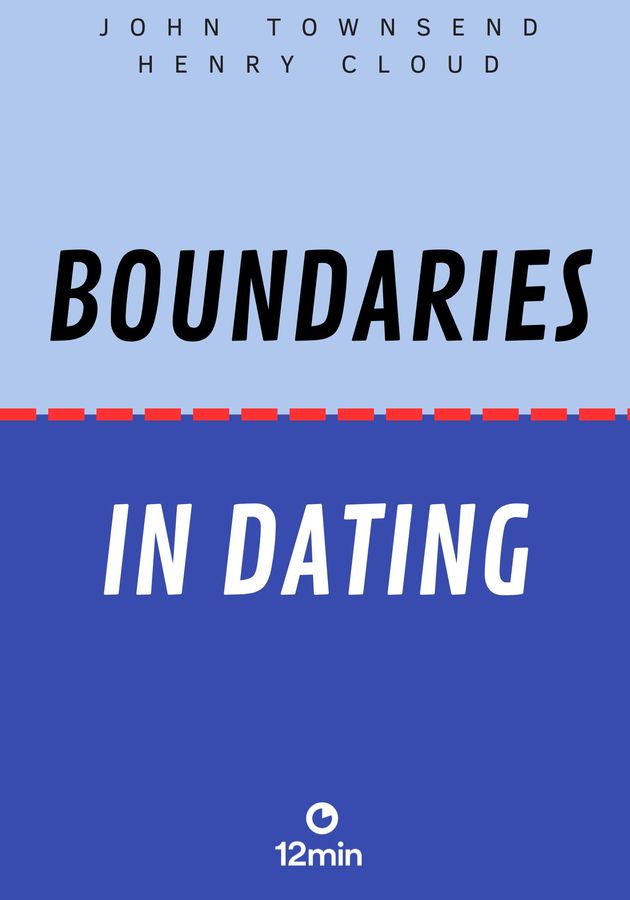In 1997, the then-lead pastor of the Covenant Life Church Joshua Harris published an extremely influential book titled “I Kissed Dating Goodbye.” In it, he laid out the quite controversial idea that dating was a secular and unchristian practice, and that young people should prefer singleness and courtship to it, that is, until they are ready for marriage. The book quickly became a bestseller and, before too long, it reestablished some long-forgotten Victorian practices among the majority of American Christian millennials, instantly propelling them into the still-lasting “New Age of Christian Purity.”
Published in 2000, “Boundaries in Dating” first hit the shelves against this backdrop. In it, Christian counselors Henry Cloud and John Townsend take a battling stance on this contentious issue, arguing in favor of dating and claiming that it is certainly not something young Christians should give up, but something they must learn to understand better. Get ready to do just that!
Oh, how do you solve a problem like… dating?
It’s a fact, so there’s no point in circumventing it: dating is difficult. It can cause a lot of hurt; it can lead to a lot of suffering. After all, the process of finding the “right type” necessarily encompasses a great deal of experimentation, and experimentation is not scientific – it is hypothesis-driven. To get to the right result, you need to make a few mistakes first. However, in dating, that comes at a price. Picking the “wrong type” over and over again while searching for the “right one” means experiencing a lot of heartbreak and despair in the meantime. Hence, it’s understandable that for many people – Christians or not – dating may one day become just too much of a burden. In such cases, to paraphrase Joshua Harris, the smartest thing one should do is kiss dating goodbye.
But Harris doesn’t stop there. In his opinion, we’re dealing with a systematic problem here, that is to say, with seven “negative tendencies” that are inherent to dating, and not to people. These tendencies are:
- Dating leads to intimacy but not necessarily to commitment.
- Dating tends to skip the “friendship” stage of a relationship.
- Dating often mistakes a physical relationship for love.
- Dating often isolates a couple from other vital relationships.
- Dating, in many cases, distracts young adults from their primary responsibility of preparing for the future.
- Dating can cause discontentment with God’s gift of singleness.
- Dating creates an artificial environment for evaluating another person’s character.
According to Cloud and Townsend, none of these problem-scenarios are created by the process of dating itself, but by the people who date, and by the way that they date. “Avoiding dating isn’t the way to cure the problems encountered in dating,” they write. “The cure is the same as the Bible’s cure for all of life’s problems, and that is spiritual growth leading to maturity.”
Why dating?
Allow us to reiterate: the problems in dating aren’t caused by the process of dating itself, but by the immaturity of the people involved. In itself, dating is actually really great, because it allows people to get to know each other better before they commit to something more serious such as marriage. But this is only one of the many benefits Cloud and Townsend see in dating. Here are six more:
- Dating provides a context to work through issues. In addition to serving as “an incubator time of discovering the opposite sex, one’s own sexual feelings, and one’s tastes in people,” dating is also a great place for couples to realize that some traits which may seem attractive in casual affairs may not hold water in closer, long-term relationships.
- Dating helps build relationship skills. As paradoxical as it might sound, it is only through a romantic relationship that one can understand the nature of romantic relationships. In other words, unless you date people, you’ll never learn how to act and react in marriage.
- Dating can heal and repair. Even though dating should never be the primary place to seek healing, it is certainly a place from which hurt people can benefit from time to time. Simply put, good dating relationships have lasting value in people’s lives, even when they don’t lead to marriage.
- Dating is relational and has value in and of itself. True, it is only in marriage that people give in to each other completely. However, that doesn’t mean when the intimacy is incomplete (as it is in dating) that it means nothing. In the words of Cloud and Townsend, “When two singles love each other, give to each other, and share something in life, although the relationship has limits of both body and heart, it has value as well.”
- Dating lets someone learn what they like in the opposite sex. How would you ever learn what you really like if you are allowed to only acquire knowledge in theory. That’s where dating comes in – through it, one can better learn not only what type of people they like, but precisely what they like in them.
- Dating gives a context to learn sexual self-control and other delays of gratification. Only bad dating is all about sex; good dating is primarily about interpersonal connection. When the latter is more important to a couple than self-gratification, then we are still talking about a loving relationship.
Boundaries in dating
Most of the problems in dating come down to a paradox inherent to love itself. Namely, the art of both love and dating is the art of learning how to exist together with someone in a couple, while being free as an individual. In other words, the art of dating is all about establishing proper boundaries. “We believe that healthy boundaries are the key to preserving freedom, responsibility, and ultimately love, in your dating life,” write Cloud and Townsend. “Establishing and keeping good limits can do a great deal to not only cure a bad relationship, but make a good one better.”
In essence, boundaries are property lines which exist to serve two important functions – above all, to define us, but just as importantly, to protect who we are. There are several kinds of limits people set and use in dating. Most often, however, boundaries come in the form of words. For example, when you’re saying no and being honest about your feelings regarding a certain subject, you are actually setting up boundaries, because you are showing what you are and what you are not, while simultaneously protecting your values, behaviors and preferences.
The best way to set up boundaries in a relationship is by way of truthfulness. Indeed, to quote the authors, “Where there is deception, there is no relationship.” Meaning, unless you are fully honest with the person you are with about who you truly are and what you want out of the relationship with them, not only are you setting crooked boundaries, but you are also leading them on. People do that sometimes for their own selfish needs, but far more frequently, they deceive and lie out of fear of conflict or fear of loneliness. However, even if you fear the other person’s anger or loss of love, it’s always better to tell the truth. “Honesty is the bedrock of any relationship, and dating is no exception.”
Whom should you date?
One of the worst mistakes people make is that they start dating to counterbalance their loneliness. “Dating was never meant to cure aloneness,” write Cloud and Townsend. “It was meant to fulfill adult needs for male-female romantic relationship on the way toward marriage.” Indeed, if you are in a relationship solely because you prefer that to being alone, you might end up feeling even more alone in the process. Lonely people aren’t good with setting up boundaries in a relationship. On the contrary, they are accustomed to giving them up! Hence, they might put up with disrespectful behavior, give in to things that aren’t in accord with their values or even settle for less – much less – than they really desire, need or even deserve!
This is because lonely people have a tendency to romanticize their partners, in a vain attempt to disguise the emptiness they feel internally. However, long-term loneliness isn’t a reflection of the normal human need for connectedness, but a sign of an injury that needs to be healed. Unfortunately, such injuries cannot be cured by dating, but by ever-meaningful relationships with God and people among whom one can be fully vulnerable. Indeed, true friendship is the only thing that can really last in an interhuman relationship – even if romantic! Whatever people say, everything from the butterflies in your stomach to the enamored glances to the raw sexual energy will one day pass; real friendship won’t. So, do take the following rule of thumb as seriously as you would a biblical commandment: “don’t ever fall in love with someone you wouldn’t be friends with.”
Put otherwise, don’t get too carried away by your initial romantic feelings. Instead, treat the other person as you would a friend – with unconditional love and healthy curiosity. People can start a relationship for all kinds of superficial reasons. However, they persist in them because of three things mainly: common interests, common goals, and common values. Most of our other preferences (or “boundaries of choice” as Cloud and Townsend would call them) are minor. We are all imperfect, after all, so you shouldn’t break off a relationship because the other person is a performance-oriented perfectionist or an annoyingly slovenly Zen-minded slacker. In mild doses, these are all imperfections that merely irritate, but don’t kill. On the other hand, any discrepancy in the values, interests and goals between two people can cause a lot of damage to their relationship.
Solving two types of dating problems
If the problem isn’t dating, but the people who do it, then there can be only two kinds of dating problems: you or the other person. If you keep asking yourself, “Why do I keep attracting such jerks?” then it’s quite probable that you might be the tricky part of the dating equation. Usually, people tend to repeat their painful pasts because of some unhealed trauma or because they are afraid of leaving something behind. But that – letting things go – is an inherent part of growth, so you must learn to own the patterns you are stuck in, instead of assuming that those you have dated are the issue. Moreover, you must learn to be honest about your preferences and desires – remember, even if you are doing it so as to not hurt the other person, lying is still lying and hurts relationships in the long run.
So, be careful: “with each decision that you make you are giving the other person an impression of what you like in life and in a relationship.” In the end, the only person you can actually blame if you end up confined within the wrong boundaries – is you. So as to prevent that from happening, always include the person you are dating in your circle of friends. If you can’t do that, then ask yourself what is it about your partner that doesn’t fit in with your normal circle of friends? Because if he or she can’t get along with the people you’ve spent your life with, then it’s quite probable that you won’t be able to spend your life with him or her. Friendship always matters – and even more so in romance.
Of course, sometimes the problem in a relationship won’t be you, but the person you are with. In that case, try to nip things in the bud. If you notice that your partner is disrespectful toward you, say that you won’t tolerate it, because in a relationship one usually gets what one can tolerate. Don’t confront on everything with your partner, but do confront on the things that are important – namely, values, dignity, and integrity. Do it with love and total honesty. Set appropriate physical limits – don’t ever do in bed something you are uncomfortable with. In fact, if you want a long-lasting interpersonal relationship with someone who respects you, you need to set a firm boundary against sex outside of marriage. Sex, after all, is “the highest way of expressing romantic love for a person,” and “therefore it must be reserved for the highest romantic relationship you will have – the one with your spouse.”
Final notes
Combining stories and anecdotes with useful guidelines and takeaway tips, “Boundaries in Dating” can be a very helpful dating resource – but, in our opinion, only if you are Christian and believe in marriage as the ultimate goal of your love life. Otherwise – and especially if you are single – you may even get the idea that there’s something wrong with you that needs to be fixed. The same holds true if you have a bit more contemporary beliefs regarding sex before marriage and same-sex couples: as modern as it attempts to be (especially in response to Joshua Harris’ then-rampant puritanism). “Boundaries in Dating” is, in many ways, a philosophical defense of traditional Christian morality.
12min tip
As soon as there is any kind of deception in a relationship, stop everything! Relationships not built on honesty and truthfulness are no relationships at all.





























